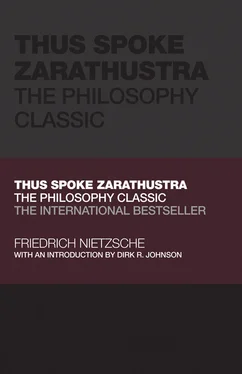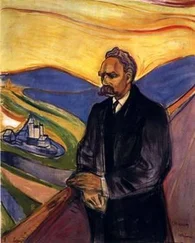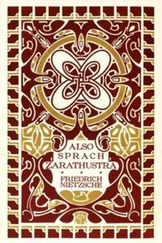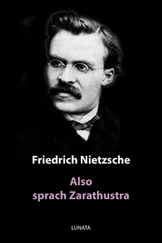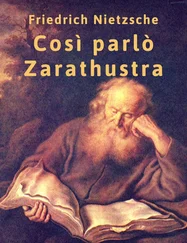Friedrich Nietzsche - Thus Spoke Zarathustra
Здесь есть возможность читать онлайн «Friedrich Nietzsche - Thus Spoke Zarathustra» — ознакомительный отрывок электронной книги совершенно бесплатно, а после прочтения отрывка купить полную версию. В некоторых случаях можно слушать аудио, скачать через торрент в формате fb2 и присутствует краткое содержание. Жанр: unrecognised, на английском языке. Описание произведения, (предисловие) а так же отзывы посетителей доступны на портале библиотеки ЛибКат.
- Название:Thus Spoke Zarathustra
- Автор:
- Жанр:
- Год:неизвестен
- ISBN:нет данных
- Рейтинг книги:5 / 5. Голосов: 1
-
Избранное:Добавить в избранное
- Отзывы:
-
Ваша оценка:
- 100
- 1
- 2
- 3
- 4
- 5
Thus Spoke Zarathustra: краткое содержание, описание и аннотация
Предлагаем к чтению аннотацию, описание, краткое содержание или предисловие (зависит от того, что написал сам автор книги «Thus Spoke Zarathustra»). Если вы не нашли необходимую информацию о книге — напишите в комментариях, мы постараемся отыскать её.
Thus Spoke Zarathustra: A Philosophy Classic, Thus Spoke Zarathustra: A Philosophy Classic
Thus Spoke Zarathustra — читать онлайн ознакомительный отрывок
Ниже представлен текст книги, разбитый по страницам. Система сохранения места последней прочитанной страницы, позволяет с удобством читать онлайн бесплатно книгу «Thus Spoke Zarathustra», без необходимости каждый раз заново искать на чём Вы остановились. Поставьте закладку, и сможете в любой момент перейти на страницу, на которой закончили чтение.
Интервал:
Закладка:
Instead, one should see Nietzsche playing with the expectations of an audience already formed by Darwinian ideas. The initial readers were inclined, then, to see in the concept of an Übermensch a future‐projected higher human type according to the popular theory of evolution. But Zarathustra's mounting anxiety as the narrative progresses is not due to his concern that he is failing to win over followers to his ideal – but because he has begun to doubt the basis for his original prophetic mission.
ZARATHUSTRA 'S NEW PHILOSOPHICAL SYSTEM?
Closely related to the first interpretation is one that believes that its three central metaphors – the Übermensch , the will to power, and the eternal return – were intended to be the pillars of a future philosophical system. In the popular imagination Nietzsche is most identified with those concepts, and it is no small part due to the influence and prophetic tenor of this work.
While Nietzsche considered Zarathustra to be his greatest achievement, his high estimation of it does not need to imply that he saw it to be the foundation for a future philosophical system – or philosophy at all. There is also no indication that he meant for its three most famous concepts to be extracted from it and to become the dominant constituents of his philosophy. Instead, he inserted the concepts into a suggestive narrative whole, and through the text he both plays with and subverts the metaphors that it seems to promote. Most of all, the concepts are intimately connected to the narrative strategies and objectives of this specific literary text.
As noted, Nietzsche stated that he had chosen his prophetic protagonist for a reason. As the first person to introduce morality to the world, Zarathustra would need to be the first to uncover the error. As the narration progresses, Zarathustra becomes aware that the higher moral ideal of the Übermensch he proposed is based on residual disgust with the way the human being is . His vision is a projection of a being that can transcend and overcome the pettiness of the current human type.
But Zarathustra harbors a spirit of gravity that weighs him down and undermines his confidence. He must confront the pain and anguish related to traumas in his past. No longer a self‐assured mighty prophet, Zarathustra is now a specific individual filled with all‐too‐human resentment.
By finding the courage to call forth his thought of the eternal return, Zarathustra must recognize that his specific life, and all the pain associated with it, cannot be redeemed through the hope of a higher ideal. Rather, his life is the one and only life that he must affirm.
He now also sees that all so‐called great men have not had the courage to embrace their lives but have sought out ideals. These were flights from the reality of life. The thought of the eternal return confronts him with the specter that life will not progress to higher, to better, but will eternally return just the way it has, with all its heartache, bitterness, and secret regret – but also with its transitory, sublime moments. Only with this recognition and its affirmation can one overcome the basis for morality and the spirit of resentment that underlies it.
ZARATHUSTRA ’S ULTIMATE MESSAGE
Thus, paradoxically, Thus Spoke Zarathustra does lay out a promise for a future ideal – even as it challenges the bases for all ideals. It is an ideal of a humankind that will (through and with him) recognize the error of morality and embrace the ever‐present moment as the greatest gift. Humans must learn to vanquish temptations for a beyond and for future‐oriented distractions, and learn to master and convert even personal adversity into acceptance and affirmation of life.
This is a tall order for us fallible human beings, requiring perpetual self‐overcoming of our greatest fears, doubts, insecurities, and weaknesses. But because we have only one life to live, it is a noble goal worthy of our efforts.
NOTE ON THE TRANSLATION
The translation used for this edition is Thomas Common's of 1909. It was the second English translation after Alexander Tille's in 1896.
Common's version of Thus Spoke Zarathustra is slightly biblical in style, as he believed Nietzsche's own text had this feel. We have kept it largely intact, although some archaic words and phrases have been modernized.
This edition also excises an introduction by Elisabeth Förster‐Nietzsche, the philosopher's younger sister, hagiographer, and executor. She took advantage of his name to promote herself, and was a Nazi supporter and anti‐Semite from whom Friedrich grew apart.
FRIEDRICH NIETZSCHE
Born in Röcken, Prussia in 1844. Nietzsche's father, who died when he was five, was a Lutheran minister, as was his grandfather.
Attended a boarding school in Pforta, then studied classical philology at the Universities of Bonn and Leipzig.
Discovered the writings of Arthur Schopenhauer in 1865.
Met the composer Richard Wagner in Leipzig 1868.
At 24 was made a professor at the University of Basle in classical philology.
Following time as a medical orderly in the Franco‐Prussian War, wrote The Birth of Tragedy.
Ill‐health forced him to resign his professorship. Living on a modest pension, he moved about Europe, writing from rented accommodation.
Wrote and published Human, All Too Human, Daybreak, and the Gay Science in 1878–1882.
Meets and breaks with Lou Andreas‐Salomé in 1882.
Wrote and published Thus Spoke Zarathustra in four parts (1880–1884).
Following Zarathustra, completed Beyond Good and Evil, The Genealogy of Morals, The Twilight of the Idols, The Antichrist, and the autobiographical Ecce Homo.
In 1889 suffered a mental breakdown in Turin. The cause is not clear, possibly syphilis or depression.
Nursed by his mother, then his sister, until his death in Weimar in 1900.
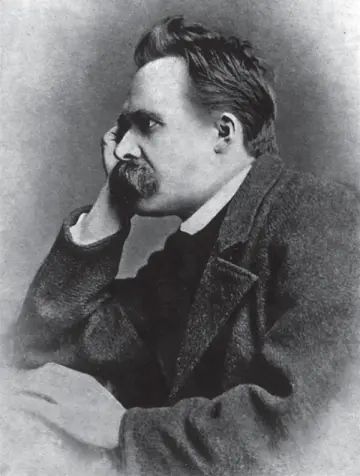
Nietzsche in 1882, the year Zarathustra I was published. Photographer Gustav Schultze.
Notes
1 1 Ecce Homo, “Why I am so Clever” 4.
2 2 Ecce Homo, “Why I am a Destiny” 3.
3 3 Ecce Homo, “Also Sprach Zarathustra” 1.
4 4 Ecce Homo, “Daybreak” 1.
5 5 Ecce Homo, “Zarathustra” 1.
6 6 Ecce Homo, “Zarathustra” 1.
7 7 Ecce Homo, “Thus Spoke Zarathustra” 4.
8 8 For the publication history of Zarathustra see William H. Schaberg, The Nietzsche Canon. Chicago: The University of Chicago Press, 1995, 87–119.
ABOUT DIRK R. JOHNSON
Dr. Dirk R. Johnsonis Elliott Professor of German at Hampden‐Sydney College, Virginia. He is the author of Nietzsche's Anti‐Darwinism (Cambridge University Press, 2010) and “ Zarathustra: Nietzsche's Rendezvous with Eternity” in The New Cambridge Companion to Nietszche (2019). Articles relating to Nietzsche have appeared in Nietzsche‐Studien , Rivista di filosofia , Journal of Nietzsche Studies , and Tijdschrift voor filosofie .
ABOUT TOM BUTLER‐BOWDON
Tom Butler‐Bowdonis the author of the bestselling 50 Classics series, which brings the ideas of important books to a wider audience. Titles include 50 Philosophy Classics , 50 Psychology Classics , 50 Politics Classics , 50 Self‐Help Classics , and 50 Economics Classics .
Читать дальшеИнтервал:
Закладка:
Похожие книги на «Thus Spoke Zarathustra»
Представляем Вашему вниманию похожие книги на «Thus Spoke Zarathustra» списком для выбора. Мы отобрали схожую по названию и смыслу литературу в надежде предоставить читателям больше вариантов отыскать новые, интересные, ещё непрочитанные произведения.
Обсуждение, отзывы о книге «Thus Spoke Zarathustra» и просто собственные мнения читателей. Оставьте ваши комментарии, напишите, что Вы думаете о произведении, его смысле или главных героях. Укажите что конкретно понравилось, а что нет, и почему Вы так считаете.
